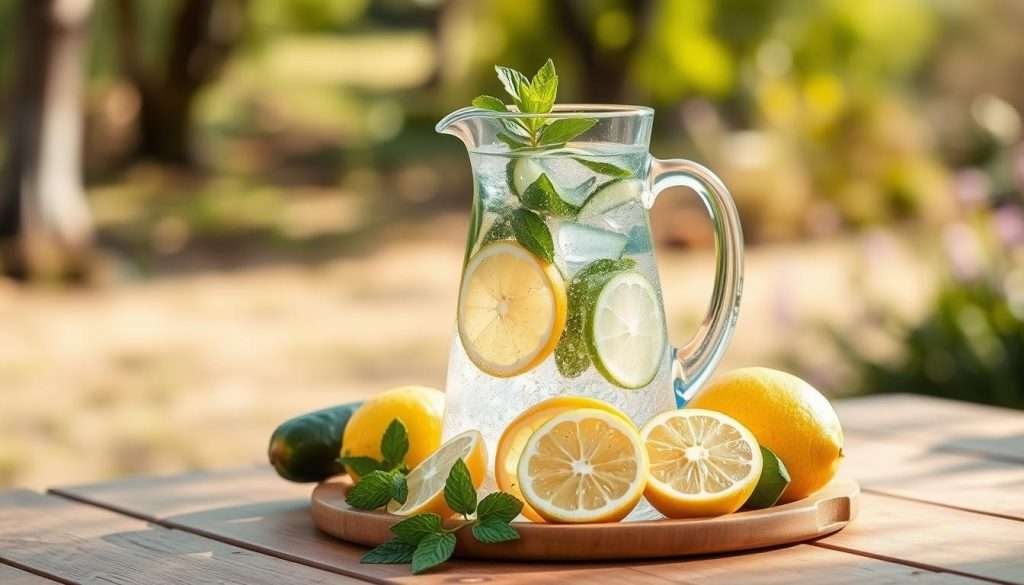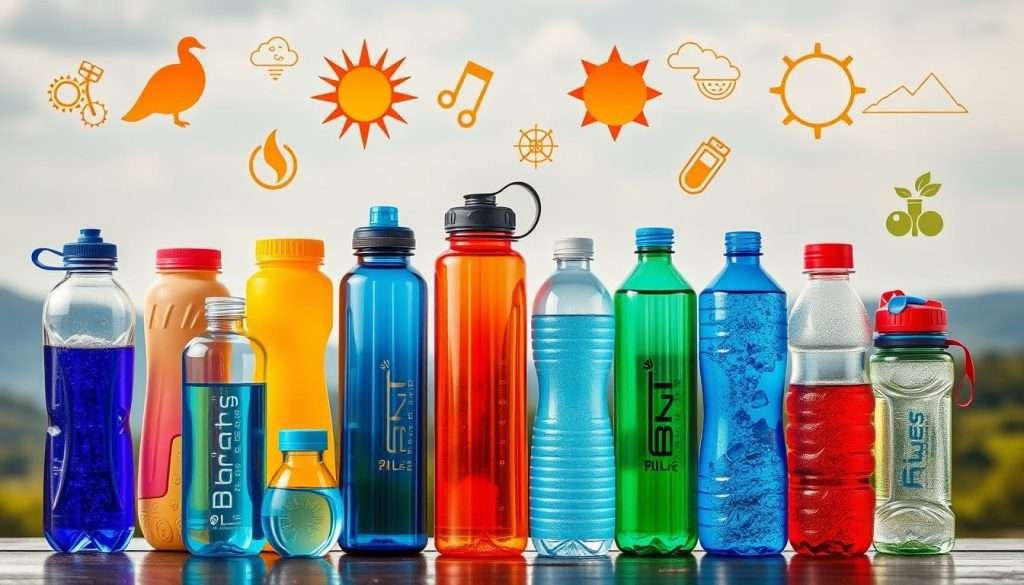Water is crucial for us as about 60 percent of our body is water. It supports many health outcomes like making our skin look better and helping our brain work well.
Being hydrated helps our body work smoothly, improves our mind, and prevents diseases. It’s important to drink enough water every day to enjoy these benefits.
Even though US adults drink about 44 ounces of water a day, everyone’s needs are different. Factors such as age, sex, and how active you are play a role. Knowing this helps you get the most health advantages from staying hydrated.
Key Takeaways
- Around 60 percent of the human body is composed of water.
- US adults drink an average of 44 ounces of plain water daily.
- The recommended daily intake of water is 11.5 cups for women and 15.5 cups for men.
- Dehydration can negatively impact cognitive functions and mood.
- Proper hydration is essential for preventing kidney stones and promoting skin health.
Understanding Hydration: The Basics
Staying properly hydrated is crucial for our health and well-being. Let’s explore hydration, why it’s important, and its three main states: euhydration, hypohydration, and hyperhydration.
Definition and Importance of Hydration
Hydration means keeping the right amount of water in our body. This is key for body functions like controlling temperature, moving nutrients, and getting rid of waste. Understanding what is hydration is about knowing its role in making sure our bodies work well. For example, drinking water before working out helps your heart, and checking your urine color is a good hydration check – pale and clear means you’re hydrated. Water is super important, making up about 60% of our body weight.
Euhydration vs. Hypohydration vs. Hyperhydration
Knowing the different hydration states is important. Euhydration means having the perfect water level for normal body functions. Athletes need to keep this balance by adjusting their water intake, especially after losing fluids during workouts.
Hypohydration means your body lacks water. It can happen with tough workouts or not drinking enough. Being dehydrated like this can make you feel more tired, lower your focus, and hurt your cognitive abilities.
Hyperhydration is having too much water in your body. Though rare, overhydration can be serious, like in extreme contests. It shows how crucial it is to keep our fluid intake balanced.
Understanding these states helps us see the importance of staying properly hydrated. It’s vital for keeping our bodies functioning well.
Fluid Intake Recommendations for Men and Women
It’s important to know how much water to drink for good health. Hydration guidelines from experts help people meet their daily water needs.
Guidelines from Authoritative Bodies
The Institute of Medicine (IOM) and the European Food Safety Authority (EFSA) give detailed advice. They’ve done a lot of research. Men should drink about 3.7 liters (13 cups) of water each day. Women should drink about 2.7 liters (9 cups).
These amounts change for pregnant and breastfeeding women. Pregnant women need about 10 cups of water a day. Breastfeeding women should increase their intake to around 12 cups.
“Approximately 40% of US adults consume less total water than the median volume suggested by the Institute of Medicine.”
Kids should drink between 6 to 8 cups of water daily. This depends on how active they are and their health.
Variations in Individual Water Needs
Everyone’s water needs are different. Factors like how much you exercise, the climate, and your health can affect this. While average recommendations help, your needs may be different.
| Group | Daily Water Intake (Cups) |
|---|---|
| Men | 13 |
| Women | 9 |
| Pregnant Women | 10 |
| Breastfeeding Women | 12 |
| Kids & Teens | 6-8 |
Hard workouts make you sweat and lose water. You might need more than water to stay hydrated. Sports drinks can replace lost electrolytes like sodium and potassium during intense exercise.
Listening to your body’s signs of needing water is crucial. Drink enough to meet your personal hydration needs. This is key for staying healthy.
Hydration and Skin Health
Proper hydration is key for our skin health. It boosts overall wellness and deeply impacts skin hydration and skin barrier function. Let’s explore how staying hydrated benefits the skin.
Effects of Hydration on Skin Hydration and Barrier Function
Discussing water and skin, it’s important to note how hydration boosts skin hydration and skin barrier function. Hydrated skin is more elastic and less likely to be dry or flaky.
A small pilot study showed interesting results. Participants drinking 2.25 liters (or 9.5 cups) of water daily for four weeks saw changes. Those who used to drink less water noticed their skin got thicker.
Experts also stress the role of moisturizers. They help keep the skin hydrated. Emollients and humectants like hyaluronic acid are key. They lock in moisture or draw water to the skin, boosting hydration.
Clinical Evidence and Relevance
Research highlights how critical hydration is for skin health. Being dehydrated can increase skin problems, especially in hot weather. It’s important to keep skin hydration and skin barrier function in good condition.
Eating right, limiting sugar and alcohol, and practicing good skincare habits are vital. Examples include exfoliating and using a humidifier. But remember, too much exfoliation can irritate the skin.
| Hydration Practice | Benefits |
|---|---|
| Drinking 2.25 liters daily | Improves skin thickness, especially for those not drinking much before |
| Using moisturizers | Restores skin hydration and keeps it moist |
| Humectants like hyaluronic acid | Attracts water to the skin, improving hydration |
| Emollients | Helps prevent losing too much fluid from the skin’s surface |
| Healthy habits | Keeps skin problems at bay and enhances skin health |
Making hydration a priority benefits the entire body and gives the skin a healthy glow. Thus, benefits of water for skin should not be overlooked.
Neurological Benefits: Cognition and Mood
It’s vital to keep hydrated for good brain health. This affects our thinking and how we feel, touching on every part of our mind’s work. Even a little water loss can make us less sharp and change our mood.
Impact of Dehydration on Cognitive Performance
A bit of dehydration, just 2% body water loss, harms our minds. In Iran, adults drinking less than two glasses of water daily faced more depression risks. Meanwhile, in the U.S., children drinking about 10.5 cups of water showed more brain flexibility.
In China, college guys went 36 hours without water and felt more tired and less confident. They also struggled with remembering things and paying attention. But drinking water again helped them bounce back, showing how crucial water is for our brains.
I always drink plenty of water before doing something that needs a lot of focus. This makes me more alert and improves my memory and reactions.
Hydration and Mood Regulation
Drinking enough water is key not just for thinking clearly but also for feeling happy. Better water habits can make us less sleepy and improve our mood. But drinking less can do the opposite, making us cranky and thirsty.
This was seen in a study of men and women, with women feeling more tired and distracted when they didn’t drink enough water. For kids, staying hydrated helps them do better in school, especially during exams. It’s clear that having water nearby is a smart move.
Adding more water to my day has surely lifted my spirits and energy. This improvement in mood and vigor is backed by science, not just my experience.
To keep our minds sharp and our emotions steady, we should drink about 2 liters of water daily. Being well-hydrated supports our brain functions and keeps us feeling good overall.
The Impact of Hydration on Overall Health and Wellness
Keeping hydrated is key to staying healthy. Our bodies are about 60% water. This shows how important water is for our body’s functions. Adding healthy hydration habits to our daily life brings many hydration benefits. These benefits include doing better physically and thinking more clearly.
Experts say drinking eight 8-ounce glasses of water a day is good. For women, around 2.2 liters (75 ounces) is ideal, and men need about 3.0 liters (102 ounces). Drinking enough water is good for your kidneys, helps manage weight, and may reduce the risk of heart problems and metabolic syndrome.
If you lose even 2% of your body’s water, it can badly affect how well you perform physically. Even being a little dehydrated, losing 1-3% of body weight, can make it hard to think clearly and change your mood. So, it’s critical to stay hydrated for your mind and mood.
Drinking enough water can also ease headaches and migraines for some. It’s also important for a healthy digestive system. Drinking regularly can help avoid constipation.
| Health Benefits | Proper Hydration Effects |
|---|---|
| Physical Performance | Prevents impairments due to dehydration |
| Kidney Health | Reduces risk of kidney stones |
| Weight Management | Enhances satiety and metabolic rate |
| Mental Health | Improves cognitive function and mood stability |
| Digestive Health | Prevents constipation and improves bowel movements |
Choosing water over caffeine or sweet drinks can really improve our health. Adults should limit caffeine to under 400mg a day to avoid dehydration. Checking the color of your urine is a simple way to see if you’re drinking enough. If it’s pale yellow, you’re good; dark yellow means you need more water.
Making these hydration benefits a part of our life can help us sleep better, feel happier, and improve our overall health. It’s important to listen to our body, especially when we’re thirsty, to keep hydrated and keep our body working well.
Hydration’s Role in Physical Performance
Staying hydrated in sports helps your body work well during exercise. If you get dehydrated, your body can’t cool down properly. This could lead to serious problems like heatstroke.
Thermoregulation and Exercise
It’s key to drink enough fluids to keep your body temperature stable, especially if you’re working out a lot. When you do intense exercise, you sweat a lot. This makes you lose water quickly.
People can lose up to two quarts of water every hour. In some activities, like long runs, it’s even more. Drinking water or sports drinks can refill your body’s water. This helps you keep going strong.
Dehydration Effects on Physical Endurance
Not drinking enough water hurts your endurance. It makes your blood volume drop, which affects your heart and muscles. If you lose more than 2% of your body water, you might feel tired, get muscle cramps, or feel dizzy.
You should drink 16–24 ounces of water or a sports drink after you exercise. While you’re active, aim for 6 to 12 ounces every 20 minutes. This helps keep you hydrated.
Electrolytes like potassium are key for your muscles and joints. They come from food and drinks. Drinks, especially isotonic sports drinks, are good for keeping your electrolytes balanced. Drinking enough is essential for your body and mind.
Gastrointestinal Health and Hydration
Keeping hydrated is key for good digestion. It helps our gastrointestinal system work better. Drinking eight to ten cups of water each day, which is about 64-80 ounces, greatly affects how well we digest food.
Link Between Hydration and Digestion
Water plays a big role in digestion, starting in the mouth. It makes up a large part of saliva, which helps moisten food so it’s easier to swallow. When we’re properly hydrated, our bodies break down food better. This helps nutrients pass through the intestines so our body can use them.
This improved digestion also helps our gut health. A healthy gut means we absorb nutrients better.
Hydration’s Role in Preventing Functional Constipation
Hydration is crucial for preventing constipation. It helps both kinds of fiber in our diet work well. Soluble fibers, found in oats, beans, and barley, absorb water to help us have healthier bowel movements. Insoluble fibers, found in whole grains and veggies, also need water to help keep things moving.
By drinking plenty of water, we can avoid digestive issues like constipation. This makes our gastrointestinal system function better.
| Benefits of Hydration | Digestive Health Impacts |
|---|---|
| Enhances Nutrient Absorption | Improves the breakdown and absorption of nutrients like amino acids, fatty acids, and sugar molecules. |
| Supports Enzyme Functions | Facilitates the breakdown of fats and carbohydrates with digestive enzymes. |
| Promotes Bowel Regularity | Maintains healthy bowel movements by adding bulk and moisture to the stool. |
| Aids in Saliva and Gastric Juices | Contributes to the production of protective and digestive fluids in the mouth and stomach. |
Drinking enough water is vital for digestive health. It supports the entire digestive process. By staying hydrated, we enhance our overall health.
Hydration for Kidney and Urinary System Health
Drinking enough water is key for keeping your urinary tract healthy and preventing kidney stones. Aim for 2.5 to 3.5 liters of water each day. This supports your kidneys and lowers the chance of getting UTIs. By drinking this much, you help your body get rid of 2 to 3 liters of diluted urine. This process cleans out toxins and helps stop stones from forming.
Prevention of Kidney Stones
Staying hydrated is a simple way to fight kidney stones. Research shows people with kidney stones usually don’t pee enough compared to others. By drinking enough to pee between 1.5 and 2.5 liters daily, you’re less likely to get stones again. For example, peeing more can cut the chance of stones coming back nearly in half.
Women especially benefit from more fluids. Their risk of kidney stones drops significantly by keeping up with their water intake. Compared to ladies who drink less, the risk can decrease noticeably depending on how much more they drink.
Hydration and Urinary Tract Infections (UTIs)
Just like with kidney stones, water can guard against UTIs. A study found that women who drank more had 48% fewer UTIs. More water meant more pee, which helps in keeping infections at bay. By staying well-hydrated, you keep the urinary tract clean, which stops bacteria from growing.
So, to avoid kidney stones and keep your urinary tract in good shape, drink plenty of water. This not only helps your kidneys but also reduces UTI risks. Making water a key part of your daily routine is crucial for your health.
Weight Management and Hydration
Staying hydrated is key to managing weight. It enhances metabolic rates and helps control hunger. This makes water a crucial ally for those trying to lose weight.

Hydration’s Effect on Metabolism
Drinking water can boost your metabolism. This helps you burn calories more effectively. For example, drinking two cups of water at 71°F can increase your metabolism by 30%. This was found in a study of 14 people.
Being well-hydrated is also good for your kidneys. These organs help balance your body’s energy use.
- More Effective Fat Burning: Drinking more water boosts fat burning.
- Efficient Kidney Function: With enough water, your kidneys work better. This reduces the energy needed for urine concentration.
Appetite Regulation Through Adequate Water Intake
Water also helps in controlling your appetite. It prevents you from eating too much. Drinking water before eating can make you feel more full. This leads to eating less food.
For instance, people who drink water before meals consume 22% fewer calories. Studies show that overweight people lose weight by just adding water before their meals. They didn’t change anything else in their diet.
- Increased Fullness: Water makes you feel full, reducing the urge to eat more.
- Calorie Savings: Choosing water over sugary drinks can save you about 250 calories each time.
- Weight Loss: Overweight women who drank water instead of diet drinks lost more weight in a study.
| Hydration Benefits | Details |
|---|---|
| Boosting Metabolism | Can increase metabolic rates by 30% through drinking water. |
| Calorie Reduction | Can lower daily calorie intake by 22% by drinking water before meals. |
| Fullness and Appetite Regulation | Helps in feeling more full, thus reducing snack cravings between meals. |
Adding enough water to your daily routine supports weight management. Remember the importance of water. It boosts your metabolism, controls your appetite, and aids in weight loss.
Chronic Diseases and Hydration
Keeping hydrated is key to preventing chronic diseases and keeping your metabolism healthy. Our bodies are about two-thirds water. This shows how vital it is to drink enough for our cells to work right and avoid chronic diseases. Most experts say women should drink about 9 cups of fluids daily, and men should aim for 13 cups.
Potential Links to Cardiovascular Health
Studies show staying hydrated is linked to good heart health. People in middle age who don’t stay hydrated are more likely to get heart failure. This fact highlights the need to drink enough water for heart health. Adults with higher serum sodium levels were also more at risk of aging faster biologically.
Those with levels above 142 mEq/L had a 10-15% higher chance of this accelerated aging. It compares to folks with levels between 137-142 mEq/L.
| Serum Sodium Level (mEq/L) | Associated Risk |
|---|---|
| 138-140 | Lowest risk of chronic diseases |
| 142 | 64% increased risk of chronic diseases |
| 144.5-146 | 21% increased risk of premature death |
Hydration and Metabolic Syndrome
Metabolic syndrome includes high blood pressure, sugar, and abnormal cholesterol. Drinking enough fluids helps the body’s metabolism. This can lower the chance of getting metabolic syndrome. Studies found that well-hydrated people are less likely to get diabetes or lung disease.
Drinking enough water helps prevent diseases, supports healthy aging, and lengthens life. By staying hydrated, we improve our metabolic health. This reduces our risk of chronic diseases.
Practical Tips for Staying Hydrated
Staying hydrated is very important. This matters more as you get older, play sports, or if it’s hot outside. Here’s what you can do to keep up your water intake:
Healthy Beverage Choices
What you drink is vital for staying hydrated. Water is the top choice. Yet, you can also enjoy water with lemon or cucumber. This adds taste without sugar or calories. Skip drinks with lots of sugar and alcohol to avoid getting dehydrated.
- Water: The simplest option. Try to drink eight glasses daily.
- Herbal Teas: Good for hydration and free from caffeine.
- Fresh Juice: Go for 100% fruit juice or mix it with water to cut sugar.
- Electrolyte Solutions: Great for getting back lost electrolytes after heavy exercise or on hot days.
In hot places like San Diego, drinking more water is key. People who exercise a lot, older adults, kids, and those with long-term health issues need to watch out for dehydration.
Recognizing Signs of Dehydration
Knowing the early signs of dehydration helps you drink up sooner. Watch for these symptoms:
- Dark-colored urine
- Fatigue
- Irritability
- Dizziness or lightheadedness
- Headaches
- Muscle cramps
- Dry mouth
If you start feeling any signs of dehydration, drink water or electrolyte-rich fluids quickly. Your age, health, and the weather can change how much water you need. Listen to your body and drink when you need to.
Eating fruits and veggies with lots of water, like watermelon or cucumbers, helps too. Drinking enough is good for your brain, mood, and energy levels.
Factors Affecting Individual Hydration Needs
Many things affect how much water we need to drink. From the water needed by different ages to how weather changes our water needs, it’s a complex process. Our body’s water needs change as we grow, move more, and face different weather conditions.
Influence of Age and Activity Level
As we age, our body’s water content changes. Babies are 75% water, but older people have only 55%. Knowing this helps us drink the right amount of water. Also, how active we are changes our water needs. If we do hard exercises or play intense sports, we lose water fast. Not having enough water can make our performance worse, even with a 2% loss.
Studies have shown mild dehydration of 1-3% body weight loss can impair various aspects of brain function.
So, for those who push their limits in sports, staying hydrated is key for both mind and body performance.

Environmental Factors: Altitude and Temperature
Where you are can also change how much water you need. Being high up in the mountains makes you lose water faster due to dry air and high breathing rates. That’s why drinking enough water at high places is vital. Temperature is another big factor. Hot weather means more sweating, which increases our need for water.
With our bodies being about 60% water, it’s clear why we need to adjust our water intake. In the US, water guidelines don’t always account for how much water we’re actually losing. This suggests we need more personalized advice on drinking water.
Understanding all these different hydration needs helps us take better care of our health. By paying attention to changes in our age, activity, and environment, we can drink the right amount of water.
Conclusion
Summing up our talk on staying hydrated shows how key it is for our health. Our bodies are about 60% water and need it to work well. Drinking enough water helps our skin, mind, and even our physical strength.
It’s smart to drink eight 8-ounce glasses a day, but remember, everyone’s different. Our age, how active we are, and the weather can change how much we need. Plus, drinking water before eating can help you lose weight by making you feel full and speeding up your metabolism.
To avoid problems like trouble thinking, worse physical ability, and kidney stones, it’s vital to keep hydrated. Choosing to drink enough water is a simple way to boost our health. I urge everyone to keep their water bottle handy. It’s an easy, important step for a healthy life.



